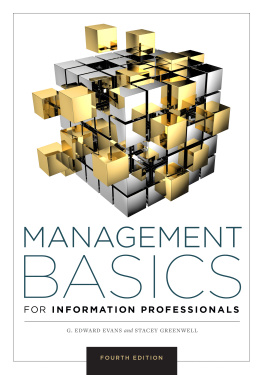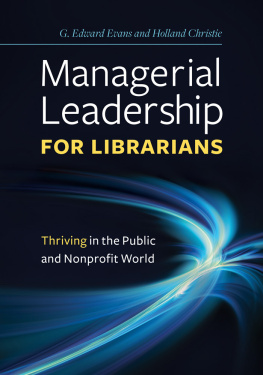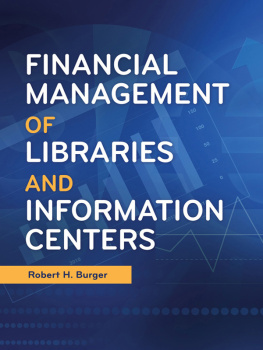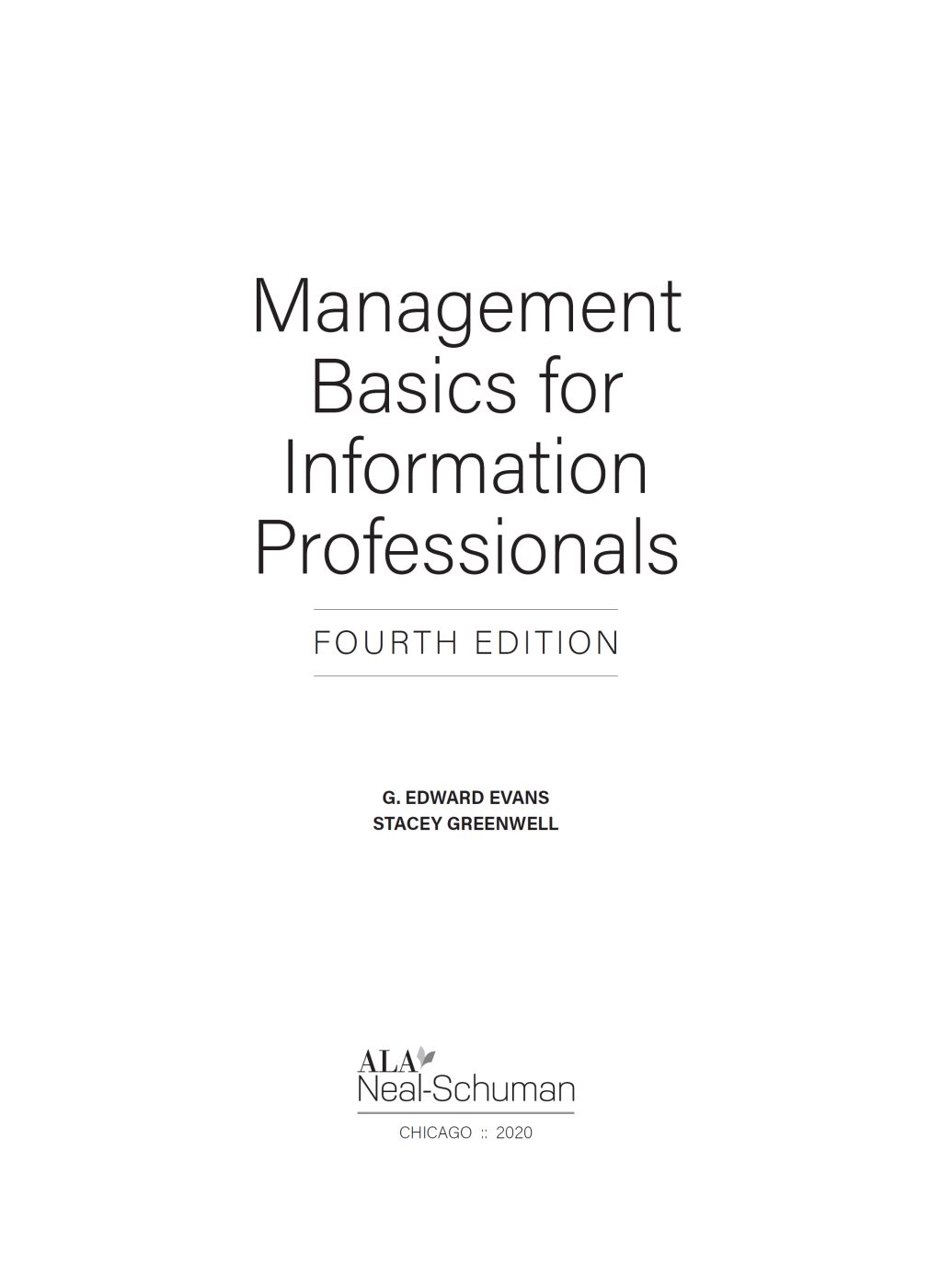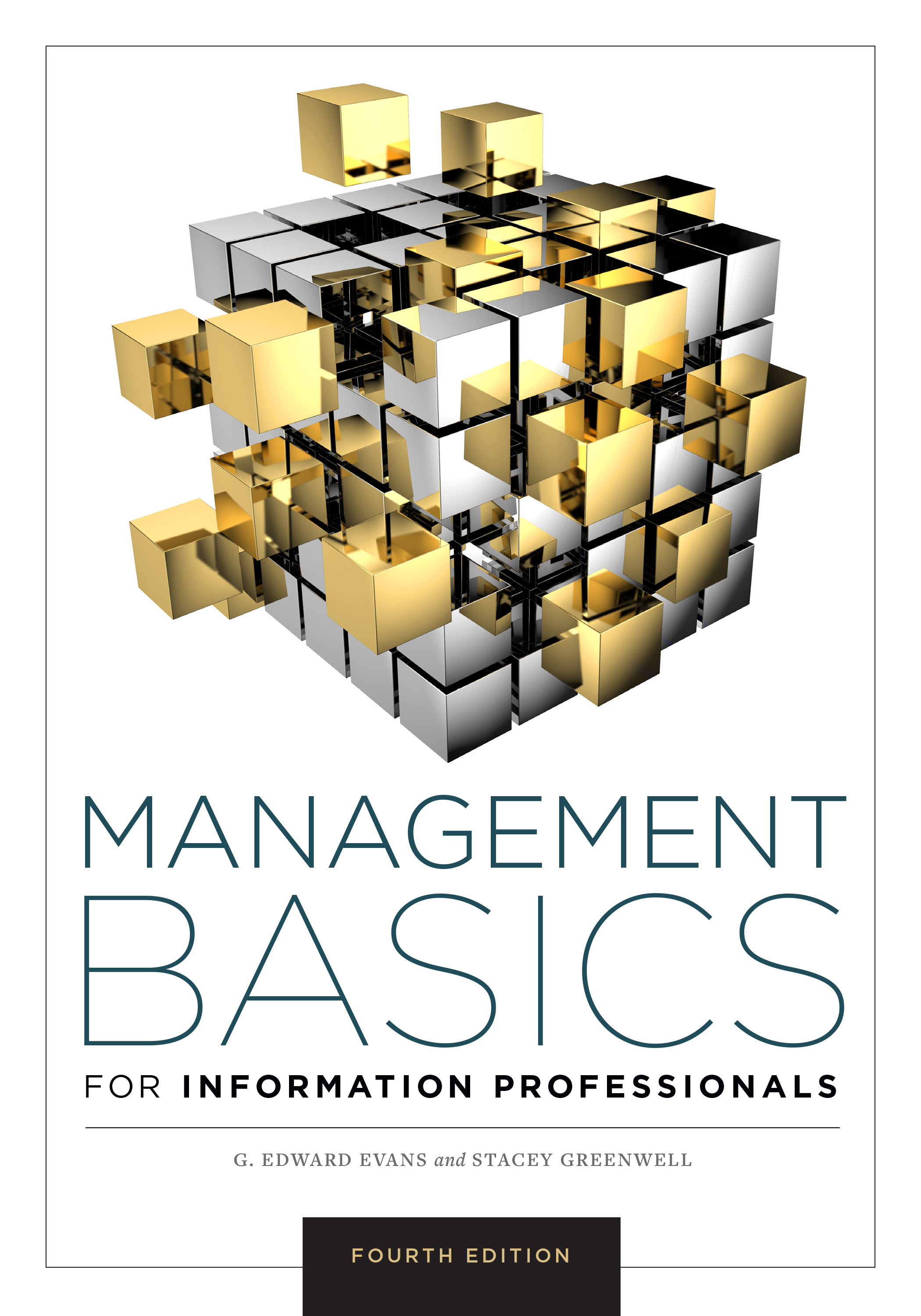
Instructors adopting this textbook for a course may request supplementary case studies by emailing .
2020 by G. Edward Evans and Stacey Greenwell
Extensive effort has gone into ensuring the reliability of the information in this book; however, the publisher makes no warranty, express or implied, with respect to the material contained herein.
ISBNs
978-0-8389-1873-9 (paper)
978-0-8389-4637-4 (PDF)
978-0-8389-4635-0 (ePub)
978-0-8389-4636-7 (Kindle)
Library of Congress Cataloging-in-Publication Data
Names: Evans, G. Edward, 1937 author. | Greenwell, Stacey, author.
Title: Management basics for information professionals / G. Edward Evans, Stacey Greenwell.
Description: 4th edition. | Chicago : ALA Neal-Schuman, 2020. | Includes bibliographical references and index.
Identifiers: LCCN 2019025745 (print) | LCCN 2019025746 (ebook) | ISBN 9780838946374 (pdf) | ISBN 9780838946350 (epub) | ISBN 9780838946367 (kindle edition) | ISBN 9780838918739 (paperback)
Subjects: LCSH: Library administrationUnited States. | Information servicesUnited StatesManagement.
Classification: LCC Z678 (ebook) | LCC Z678 .E9 2019 (print) | DDC 025.1dc23
LC record available at https://lccn.loc.gov/2019025745
Cover design by Kimberly Thornton; imagery Adobe Stock.
ALA Neal-Schuman purchases fund advocacy, awareness, and accreditation programs for library professionals worldwide.
CONTENTS
TABLES
FIGURE
T his edition has a three-fold purpose. The first is to introduce a new coauthor, Stacey Greenwell, who was a great collaborator in preparing the second edition of Academic Librarianship, another ALA Neal-Schuman publication. The second purpose is to make clear that an organizations operational sectorfor-profit, nonprofit, or publicplays a determining role in how you carry out basic management functions. The final purpose is to be more concise while adding new ideas and examples.
The second purpose is perhaps the most significant. As with many introductory texts, prior editions of this book failed to seriously address the critical role that the librarys context plays in how basic management functions operate. Almost all libraries, with the exception of corporate libraries, are in either the public or nonprofit sectors (and some are in both). Those sectors have a major influence on what the basic elements of management will be and how they can be applied and remain within the law. (Indeed, as outlines, in broad strokes, the sector differences. The later chapters provide details of how those differences impact the application of basic management concepts.
More often than not, when you read something in the library literature about a new idea related to managerial practice, it arose from work done in the for-profit sector. To be sure, there is research done on public and nonprofit organizations; however, it is not as extensive and often only applies to a narrow segment of the sector being investigated.
In this edition, the books chapters have been restructured into five broad sections. focuses on managing yourself and your career.
Although this edition has substantially reduced the number of printed pages, there is new material in all of the chapters. The page count reduction was achieved through tighter, more concise language. The use of sidebars that present real work experiences, suggestions for further reading, and things to think about have been retained and updated.
As was true with prior editions, we were lucky to have several seasoned managers and teachers who provided essential guidance and thinking regarding the content of this edition. Special thanks go to:
Holland Christie is Manager of the Battle Ground Community Library, one of the libraries in the Fort Vancouver Regional Library District in Vancouver, Washington. She has worked in a multitude of roles within public libraries, including Programming Librarian, Youth Services Librarian, Public Services Manager, and Deputy Director. She received her MLS from the University of Arizona and a bachelors degree in English from Northern Arizona University. She has worked as a contributing editor and coauthor on several fiction and nonfiction titles; her most recent book project was as coauthor of Managerial Leadership for Librarians (Libraries Unlimited, 2017).
Maggie Farrell is Dean of Libraries at the University of Nevada, Las Vegas. She previously served as Dean of Libraries at Clemson University and the University of Wyoming. She writes the quarterly column Leadership Reflections for the Journal of Library Administration. She also is active in the American Library Association, serving in various leadership roles. She received a BA from the University of Missouri-Kansas City, an MLS from the University of Arizona, and a Masters in Public Administration from Arizona State University.
Patricia Layzell Ward is semi-retired. Currently she is Hon. Archivist Modern Collections to the Ffestiniog Railway Company. She has worked in public and special libraries and enjoyed a long-time involvement in teaching and research. This included posts at North-Western Polytechnic, Loughborough University, Curtin University Western Australia, and the University of Wales Aberystwyth. She is Emeritus Editor of Library Management; author of conference papers, journal articles, and reports; examiner to a number of universities; a consultant in Europe, South America, South-East Asia, and Australia; and formerly active in IFLA. She is a Fellow of the Chartered Institute of Library and Information Professionals and holds a masters degree and PhD in Library, Archives and Information Studies from University College London.
Joseph Mika is Professor Emeritus at the School of Information Sciences, Wayne State University, Detroit, where he twice served as Director of the School during his twenty-five-year tenure at the University. He was also Assistant Dean at the School of Library and Information Science at the University of Southern Mississippi, Hattiesburg; Assistant Library Director at Johnson State College, Vermont; and Assistant Library Director at the Ohio State University, Mansfield Campus. His teaching areas included administration, customer service, personnel management, and collection development. He was co-owner of Hartzell-Mika Consulting, a firm in operation from 1999 to 2019, which provided assistance with library director searches, strategic planning facilitation, facility development and planning, and staff and board training sessions. Mika is a retired Colonel in the U.S. Army, having served twenty-nine years in the Army Reserves.
Maggie Saponaro is Director of Collection Development Strategies at the University of Maryland Libraries, where she is responsible for the leadership and vision for the content of purchased and licensed collections across all disciplinary areas and formats. In this position, she directs the collection development work of the Libraries subject specialist liaison librarians, with primary responsibility for content and budgeting of the UMD Libraries general collections. She also serves on the Collection Strategies and Services administrative team for policy creation and strategic planning across the entire division. She was formerly Associate Director of Learning Resources at the Alexandria Campus of Northern Virginia Community College and a librarian for the College of Human Resources at Virginia Polytechnic Institute and State University. She is currently interim chair of the NorthEast Regional Library (NERL) Program Council Executive Committee and is a member of the Nexis Uni Advisory Committee. She holds a masters degree in library science from the University of California, Los Angeles, with postgraduate work in the areas of personnel programs and public administration.
Next page
